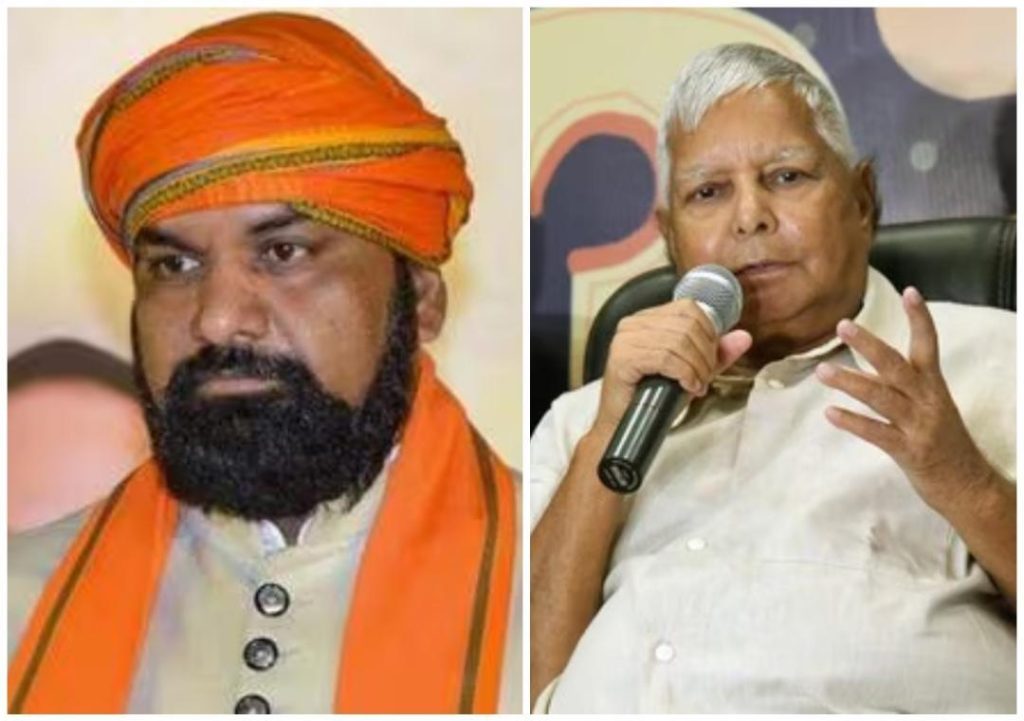
Title: Lalu is the ‘Gabbar’ of Bihar, he scares everyone: Bihar Dy CM
The upcoming assembly elections in Bihar have brought forth a plethora of controversies, with politicians from both sides engaging in a war of words. The latest salvo has been fired by Bihar Deputy CM Samrat Choudhary, who has compared RJD chief Lalu Prasad Yadav to the infamous villain Gabbar Singh from the iconic Bollywood movie Sholay. In a shocking statement, Choudhary alleged that over 1.25 crore people left Bihar due to Lalu’s fear, and that he is the person who scares everyone, regardless of their community or social class.
This statement has sent shockwaves across the political spectrum, with many questioning the tone and intent behind Choudhary’s remarks. However, it is essential to understand the context and implications of his statement, as well as its potential impact on the forthcoming elections.
For those who may not be familiar with the reference, Gabbar Singh is a fictional character from the 1975 Bollywood movie Sholay. He is a ruthless and cunning dacoit who is feared by everyone in his vicinity. Choudhary’s comparison of Lalu to Gabbar suggests that Lalu has a similar reputation for being feared and intimidating, which has led to a significant exodus of people from Bihar.
Choudhary’s statement is likely an attempt to portray Lalu as a divisive figure who has created an atmosphere of fear and uncertainty in the state. By linking Lalu to Gabbar, Choudhary is implying that Lalu’s presence has a chilling effect on people’s lives, making them feel anxious and uncertain about their future. This portrayal is likely an attempt to appeal to voters who are looking for a change in the status quo and want a leader who can bring stability and peace to the state.
However, it is essential to note that Lalu’s reputation as a feared figure is not entirely unfounded. During his tenure as the Chief Minister of Bihar, Lalu was known for his strongarm tactics and his ability to manipulate the political landscape to his advantage. His party, the Rashtriya Janata Dal (RJD), has a reputation for being ruthless and aggressive in its political dealings, which has led to a high degree of mistrust among the electorate.
Moreover, Lalu’s involvement in various corruption scandals, including the infamous fodder scam, has tarnished his reputation and led to widespread discontent among the people of Bihar. The fact that over 1.25 crore people have left the state due to fear and uncertainty is a testament to the widespread disillusionment with his leadership.
However, it is also important to note that Lalu’s reputation as a feared figure is not limited to his political opponents. Many in his own party and community view him as a strong and fearless leader who has fought for the rights of the downtrodden and the marginalized. His ability to mobilize large sections of the population and his strong connections with the rural masses have made him a formidable force in Bihar politics.
In the context of the upcoming elections, Choudhary’s statement is likely an attempt to portray Lalu as a liability rather than a strength. By highlighting Lalu’s reputation for being feared and intimidating, Choudhary is trying to create a narrative that Lalu is a polarizing figure who cannot bring people together and build consensus. This narrative is likely an attempt to appeal to voters who are looking for a leader who can bring stability and peace to the state, rather than one who is feared and resented.
However, it is essential to acknowledge that Lalu’s reputation as a feared figure is not entirely negative. His ability to mobilize large sections of the population and his strong connections with the rural masses have made him a powerful force in Bihar politics. His leadership has also brought significant benefits to the state, including improved healthcare and education infrastructure, as well as increased investment in agriculture and industry.
In conclusion, Choudhary’s statement comparing Lalu to Gabbar is likely an attempt to portray Lalu as a divisive figure who has created an atmosphere of fear and uncertainty in the state. While Lalu’s reputation as a feared figure is not entirely unfounded, it is also important to acknowledge his ability to mobilize large sections of the population and his strong connections with the rural masses. As the election campaign heats up, it will be interesting to see how these contrasting narratives play out and whether Choudhary’s statement has any impact on the outcome of the elections.






